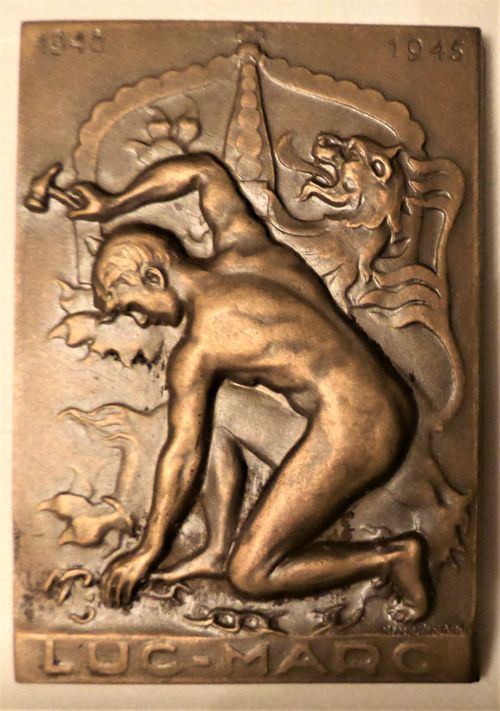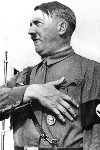'The Wild Beast Springs Out of His Lair'
The War Illustrated, Volume 2, No. 38, Page 538-541, May 24, 1940.
On May 10, 1940, the Western Front blazed up into a fury of martial activity, as Hitler, with supreme disregard for the law of nations and the principles of civilization, flung his legions on the little countries of the Netherlands and Belgium. The opening of this new phase of the war is described below.
Before dawn on Friday, May 10, the anti-aircraft guns outside Amsterdam blazed into action at a handful of Nazi 'planes caught for the moment by the probing fingers of the searchlights as they appeared above the city from the east. That was at 2.41 a.m.; it was the herald of the coming storm.
Some twenty minutes later German troops began to cross the frontiers of Holland, of Belgium and of Luxemburg, sweeping aside such local opposition as was mustered for the moment, and at the same time vast numbers of German aeroplanes speeded above them, heavily charged with bombs and parachute troops. Shortly after 4 a.m. the first of the parachute troops began to patter down upon the still dark countryside of the Netherlands, and by 5 o'clock Brussels had been bombed, and also a large number of towns in Northern and Eastern France, including Calais and Dunkirk, Lille and Nancy, and Pontoise, not far from Paris. The bombers' principal objectives were the aerodromes; and many of the aerodromes occupied by the R.A.F. behind the Maginot Line were similarly visited, without much damage being done.
At 6 o'clock a German ultimatum was delivered to the Dutch, Belgian and Luxemburg Governments, in which it was declared that inasmuch as a “British and French offensive against Germany was imminent” and that “it was intended to take place against the Ruhr via Belgium and Holland”, German troops had received orders “to safeguard the neutrality of these countries with all their military means”. The German troops were “not coming as enemies of the Belgian and Dutch peoples”, it was averred, and if the Governments wanted to safeguard the well-being of their peoples then they should see to it that the German troops should meet with no resistance whatsoever. But “should the German troops be offered resistance in Belgium or Holland this resistance will be broken with all means”.
To this insolent demand Holland and Belgium made swift and uncompromising reply. Addressing herself to her people, Queen Wilhelmina made a “flaming protest against this unprecedented violation of good faith and violation of all that is decent between cultured States”. She went on, “I and my Government will do our duty. Do your duty everywhere and in all circumstances. Every man to his post.”
King Leopold, too, spoke to his people. “For the second time in a quarter of a century”, he said, “Belgium, honest and neutral in her conduct, has been attacked by the German Reich, which treats with contempt the most solemn pledges ... I shall remain faithful to the oath I took under the Constitution to maintain the independence and integrity of my country as my father did in 1914. I have placed myself at the head of the Army with the same faith and confidence in our cause. Belgium is innocent, and with the help of God she will triumph.”
Compare with these noble and dignified appeals to the conscience of enlightened humanity the rodomontade with which Hitler sent his troops into what was soon to be described as the greatest battle in history. “For 300 years”, raved the Fuehrer, “it has been the aim of Britain and France to prevent any consolidation in Europe, and especially to weaken Germany. The German people have no hatred against the British and French people, but we are today faced with a question of life or destruction.” After repeating the lie about the Allies' alleged plans to attack the Ruhr through Belgium and Holland, the Fuehrer concluded: “Soldiers of the Western Front, your hour has come. The fight which begins today will determine Germany's future for the next thousands years.”
Von Ribbentrop, too, expressed himself in characteristic fashion: “The German Army”, he said, “will now speak to Britain and France in the only language which their rulers seem to understand, and settle with them once and for all.”
Turning from words to deeds, we already know enough to be able to recognize May 10 as one of the most amazing days in the whole panorama of history. Nothing was too fantastic to be performed by the Nazis in their attempt to capture Holland in the course of a few short hours. Mr. Van Kleffens, the Dutch Foreign Minister, when he arrived in England on May 11, said that the German parachutists descended on Holland like rain, many of them dressed in British, Dutch, Belgian and French uniforms. “Other Germans were hidden in river barges. Others were landed in seaplanes. They used the harbour bays and docks with great daring. Armed with heavy machine-guns they established themselves everywhere in fields and behind dykes.” One of the first places to be seized by the Nazis was Rotterdam aerodrome, and the Dutch suffered many casualties before they were able to recapture this vital spot. Another detachment of parachutists had descended at Delft, four miles south of The Hague, charged with the desperate plan of cutting off the Dutch capital from the rest of Holland and of capturing the Queen and the Government. Here again the Dutch were fortunately able to must sufficient force to put the parachutists out of action.
Many other parachute landings were reported throughout the day, and the wireless station at Hilversum was kept busy in informing the local authorities of the approach of Nazi 'planes believed to be carrying troops. All over Holland isolated detachments of the foe were doing their utmost to hamstring the Dutch advances and to weaken the morale of the Dutch people. In both these objects, however, they failed, for traditional stubbornness of the Hollanders was abundantly manifested. “I saw them crying”, said one English observer, “but they were tears of rage and not terror”.
With undaunted courage the gendarmerie and police, aided by the regulars, mopped up the parachutists and destroyed the armed nests organized by German sympathizers. It was fortunate that the Dutch had been forewarned by the extent of a few hours, and had already arrested some of the potential Quislings – many persons whose names appeared on the letters of instruction with which the parachutists had been so considerately furnished at their depots.
How the battle was going at the front was revealed in a communiqué issued by the Dutch General Headquarters on the evening of May 10 – the first communiqué, it may be noted, since Holland was last at war, in 1831. It announced that following the crossing of the frontier by German troops at several places at 3 a.m., Dutch frontier troops had blown up the bridges over the rivers Maas and Yssel. Aeroplane attacks on aerodromes had been made, but the army and navy were ready. Flooding, it continued, was being carried out according to plan.
An account of the opening day's fighting on the Belgian front was given by M. Pierlot, the Belgian Prime Minister, on a broadcast on the evening of Sunday, May 12. “On Friday”, he said, “the enemy were not able to penetrate into our territory at any point on any considerable scale. Thorough demolitions were immediately carried out everywhere along the frontier, and checked the advance of the enemy.”
On Saturday, however, went on the Premier, the enemy succeeded in crossing to the north of the Albert Canal.
The officer charged with the destruction of the two bridges next to Maastricht was killed by an aerial bomb. This caused a delay in carrying out the order, which was used by the enemy to occupy the two bridges and to cross them with motorized forces.
Later on, however, one of our officers penetrated into the German lines, reached the mine chambers, and blew himself up with the bridge, thus heroically sacrificing his life in the accomplishment of his duty.
Thus the enemy had only one bridge left at his disposal. Across this they attacked our troops with an enormous mass of tanks and aircraft.
In spite of the fierce resistance they offered our troops had to withdraw as far as Tongres. In the afternoon we counterattacked with our motorized forces and aircraft, but although severe losses were inflicted upon the enemy we could only succeed in retarding his advance.
M. Pierlot went on to say that fierce enemy attacks were being delivered against the fortifications: “The glacis of these forts is covered with German corpses.” He made no attempt at disguising the gravity of the situation, but he concluded with a note of calm resolution. “Be confident of victory”, he said, “and with the help of our Allies we shall triumph”.
“With the help of our Allies.” For by now it had been revealed that the appeal to Britain for aid which had been made by Queen Wilhelmina and King Leopold in the early hours of May 10 had been answered within half an hour and that before the day was over a great stream of French and British soldiers was sweeping across the Belgian frontier to help the men of the Low Countries in combating the flood of Nazi invasion.
[The story of the forced capitulation appears in page 548].
Index
Previous article
I Was There! - I Was Doctor on the Bombed Hospital Ship
In spite of denials by the German news agency, the bombing by German airmen of Norwegian Red Cross ships at Aalesund were confirmed by several trustworthy eye-witnesses, including Professor Leif Kreyb
Next article
'War With All Our Might'
I say to the House, as I said to the Ministers who have joined this Government, I have nothing to offer but blood and toil and tears and sweat. We have before all of us an ordeal of the most grievo





